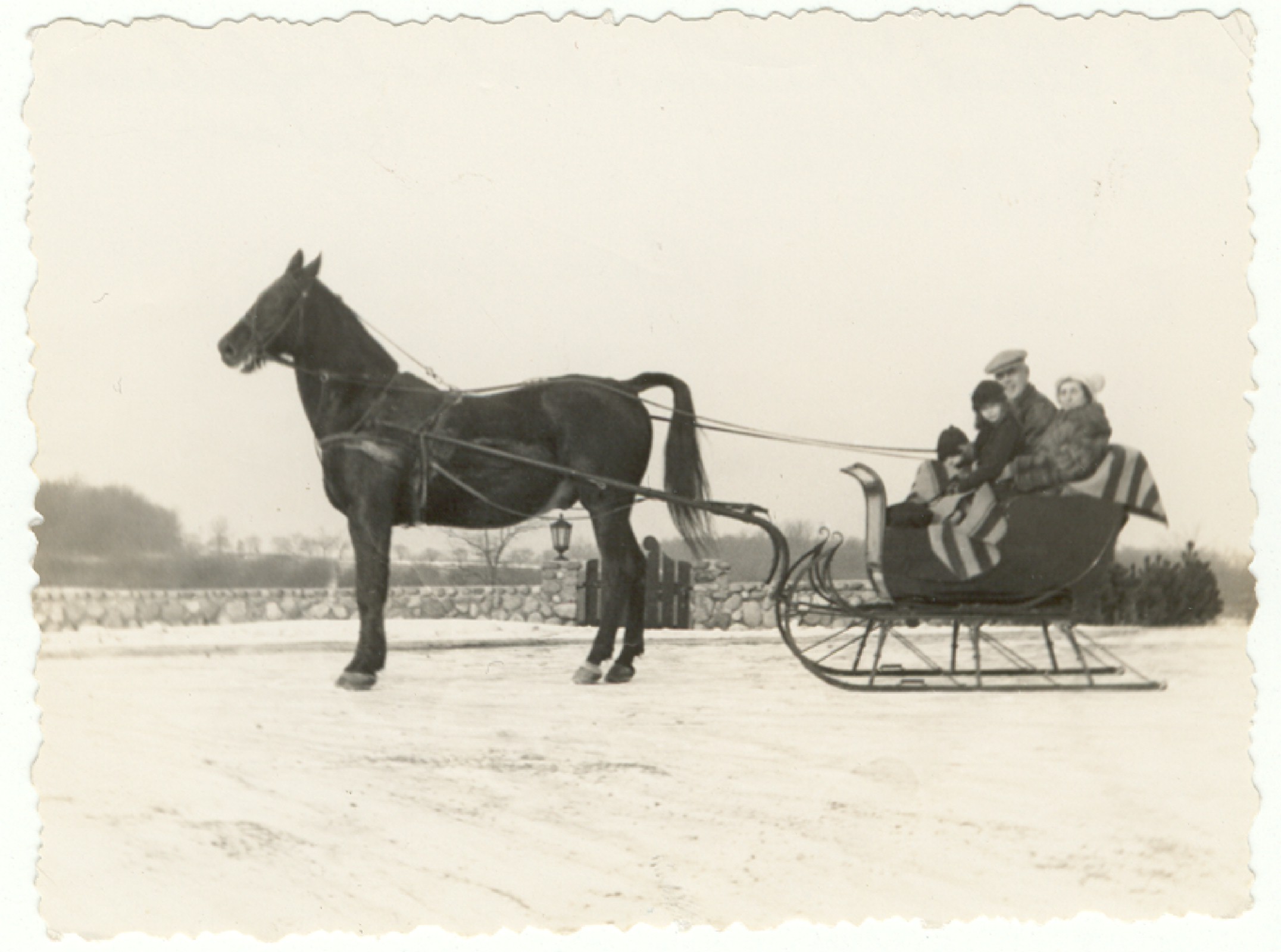Christmas at Meadow Brook has long been the time for friends and family to gather and share in the joy of simple traditions.
By Madelyn Rzadkowolski
Twinkling Christmas lights illuminated the theater’s soaring vaulted ceiling, set with small balconies carved with Mother Goose characters, as angelic voices filled the air. The room roared with applause when the chorus of orphan children filed off the stage on a quest for cookies, milk, and presents from Santa. Four of the children were not like the rest. Not only had Frances & Daniel Dodge and Richard & Barbara Wilson been in the audience during the performance, but they had been sitting next to their parents.
This was the dichotomy in which the Dodge and Wilson families grew up. Christmas was spent with family and gifts at Meadow Brook while the evening before was dedicated to learning about friendship, community and generosity at the orphanage their mother helped found. As Matilda Dodge Wilson’s wealth grew, so did her commitment to raising her children to understand their responsibilities. They needed to empathize and understand the different lives and experiences of others, an especially valuable lesson during the holidays.
Caroling All the Way
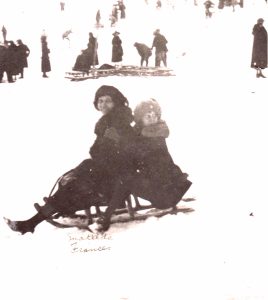
Matilda married John Dodge on December 10, 1907 and met her three stepchildren for the first time that evening. Eager to bring Christmas traditions into the home, Matilda told John the only present she wished for was a piano for the children. The 1907 plum pudding mahogany Steinway & Sons grand piano in Meadow Brook’s living room—John’s first Christmas gift to Matilda—became a centerpiece for family cheer for decades to come.
John’s sister, Delphine, who lived with them in Detroit, was an accomplished songwriter and performed some of her own songs, including “When Christmas Comes,” published in 1901. Piano sheet music and lesson books from all of the Dodge and Wilson family members remain in the Meadow Brook collection.
Once the family moved into Meadow Brook Hall, the Aeolian organ joined their musical repertoire. On Christmas Day, Matilda and her second husband, Alfred Wilson, would put a music roll on the organ’s player system, sit in front of the fireplace, and watch the children play with their new toys.
The Most Wonderful Time of the Year
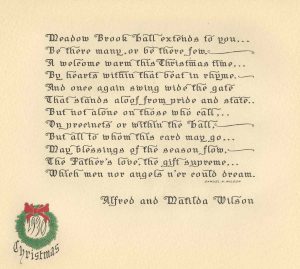 On November 21, 1927, Matilda wrote a memo to her secretary about the work at Meadow Brook she needed to complete before the new year. This to-do list ranged from the more mundane (selecting hardware, plumbing and electrical fixtures, laundry and kitchen equipment) to the frugal (checking fixtures from her old house to see what could be re-used) to the more complex (deciding the number of special telephones, the location and type of light switches in every room, the locks for every closet and cabinet, etc.).
On November 21, 1927, Matilda wrote a memo to her secretary about the work at Meadow Brook she needed to complete before the new year. This to-do list ranged from the more mundane (selecting hardware, plumbing and electrical fixtures, laundry and kitchen equipment) to the frugal (checking fixtures from her old house to see what could be re-used) to the more complex (deciding the number of special telephones, the location and type of light switches in every room, the locks for every closet and cabinet, etc.).
She also would need three mornings off a week for business meetings, at least two full days a week in the office, and two private days for getting her hair waves set (a more laborious process than today). She wrote, “I have no time for riding or driving or social affairs, and expect to sandwich in what time is needed for running and training household servants.”
As many parents know well, Matilda was also in the throes of planning for Christmas. She would devote five days to traveling to New York to purchase Christmas gifts and would simultaneously meet with interior decorators and purchase items for the new house. Her evenings were spent sending out Christmas cards and wrapping presents, and she planned to take Thanksgiving, Christmas and Boxing days off to be with her family.
Even after Meadow Brook Hall was finished, Matilda filled her schedule with many tasks and duties, but Christmas remained of utmost importance. Staff recalled she spent months preparing for it, hand-picking hundreds (if not thousands) of gifts for family, friends, staff and those in need. Her children considered it a special treat when she took them downtown Detroit to shop for gifts at J. L. Hudson’s department store. They chose presents for the staff who cared for them and gave their mother advice on what toys and clothes the children at the orphanage might like.
Dashing Through the Snow
In 1959, Matilda told the Detroit Free Press her favorite memory was gifts being delivered by horse and cutter on Christmas morning, a tradition she continued with her own family. “When I was a girl, at home, our Christmases were very simple. We were a small family and our relatives lived too far away in Canada to be with us. This is probably why I’ll always remember the exciting times at Meadow Brook.” With five children, three stepchildren and many grandchildren, Christmas was always a fun and joyful time, even as family dynamics changed.
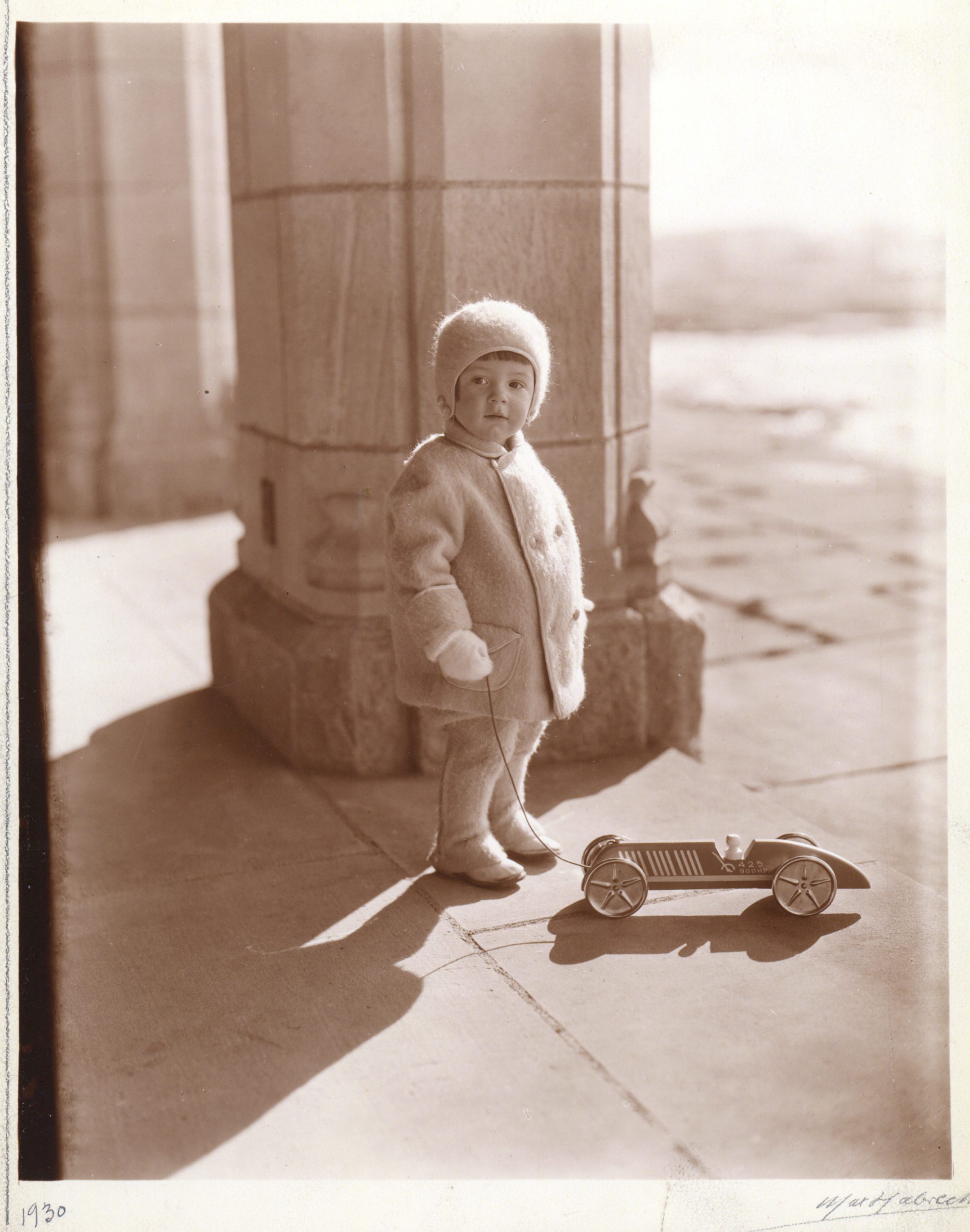
In later years, Frances, wearing a long red velvet cape, took on the role of delivering presents on Christmas morning, and the family placed them under the tree together. Richard and Barbara gleefully remembered one year when Frances brought a horse through the front door and into the living room as a present for their mother—a joke they swore only Frances could get away with.
A home video shows Alfred, Matilda, Richard and Barbara sitting together on the floor in front of a lit tree, having just finished setting up Richard’s new electric train set. His most memorable gift was his first two-wheeled bicycle. Because of the snow that year, his parents let him ride it inside. Motorized children’s cars were another popular gift; in 2019, grandson John donated a cherry red child-sized electric Model T to Meadow Brook. It was a present from his grandparents on what must have been another snowy Christmas, as he recalled his Matilda furiously trying to find someone to put chains on the tires so he could safely drive it around.
Around 4 p.m., some of the Wilson’s nearby family would arrive for dinner. The meal was soup, turkey (carved by Alfred), mashed and sweet potatoes, peas and another vegetable, cranberry sauce, salad, mince pies, pumpkin pie and ice cream. Most of the food was sourced directly from Meadow Brook Farms.
The iconic sleigh figured into supper time as well, as explained by Richard: “There was a big sleigh in the center of the table with three strings attached for each child. After each course, we children would pull a string and find a gift on the end.” Inside were choice gifts, like fountain pens, jewelry and watches.
“Holiday dinners for the employees were outstanding too: The table set with some of Mrs. Wilson’s special linens, dishes and of course a center piece from the greenhouse….The staff Christmas tree was large and lovely with many beautiful gifts. Everyone received one from each member of the family, plus an envelope with a gift of money from Mr. and Mrs. Wilson, also from the pets for the party who cared for each of them.” – Beatrice Whitaker, head housekeeper.
All of the live-in staff—including the governess—celebrated the holiday in the service quarters without their regular duties. Besides their gifts and bonuses (from family and pets), live-in staff received a poinsettia from the estate greenhouse and outside staff received a turkey for their family dinner.
Barbara Gay Thorpe, whose father Frank Gay was the dairy manager on the estate, recalled how important the gift of a Christmas turkey was to the staff and their families. One year, while playing near the turkey hutches on the other part of the estate, her mischievous older brothers encouraged her to steal turkey eggs and smash them on a rock in the nearby stream. Barbara’s parents, using some fear-based dissuasion tactics, told her no one got a turkey that year. For a child who grew up during the Great Depression—even though much of it was on the bountiful Meadow Brook Farms—this tall tale taught Barb a valuable lesson about consequences.
Joy to the World
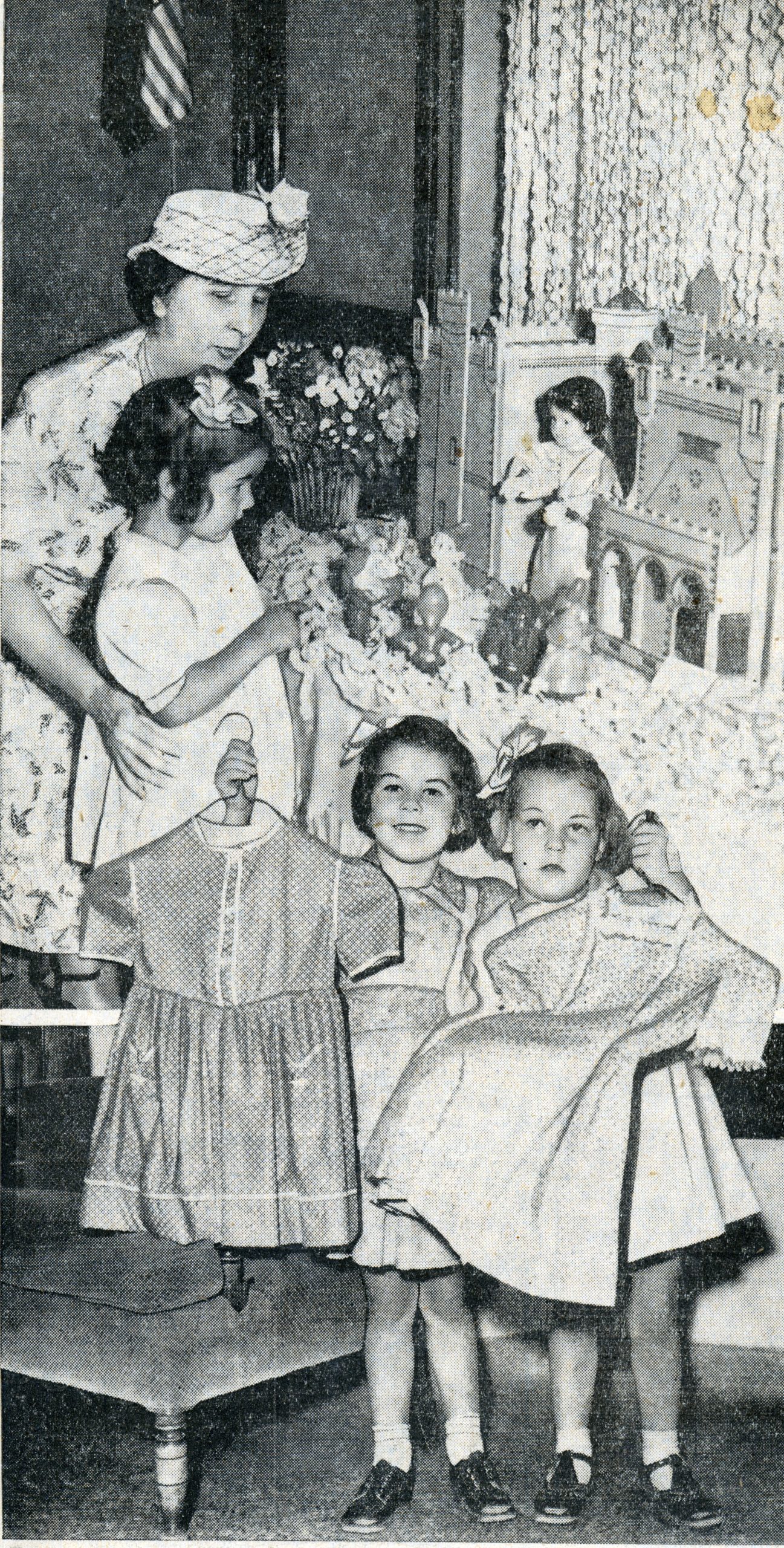
Year-round, Matilda devoted her talents, time and wealth to bettering the lives of others, and the Salvation Army served as catalyst in many of her ventures. Beyond acting as Auxiliary President for 23 years, she also supported the construction of Booth Memorial Hospital and Denby House, a home for children and unwed mothers in Detroit.
Every Christmas Eve, after wrapping presents for 60-80 children, the Wilson family visited Denby House. After watching the children perform a play, Matilda and her family distributed gifts and shared cookies and milk. Matilda was said to know each child individually and she spent weeks personally picking out a new outfit and toys for each child. Her generosity, however, went beyond the financial. The Salvation Army named her Volunteer of the Year for her tendency to show up on Christmas during the Depression with food from Meadow Brook Farms, roll up her sleeves and help cook a healthy breakfast.
As president of the Auxiliary, Matilda also led an annual Toy Shop, where parents could come and choose toys for free for their children while the club women volunteered as clerks. During the world wars, Matilda helped send presents and supplies to soldiers, including 12 gallons of orange marmalade to Camp Custer in 1918. Fruits, and especially oranges, were a popular but pricey Christmas present. Though the oranges Matilda grew in her greenhouse wouldn’t survive the journey to the soldiers, she did make sure to put oranges in the pockets of the clothes given to the Denby House children every Christmas.
Matilda didn’t just think of the young at Christmas. In 1959, more than 500 students were spending their first holiday season at the newly-founded Oakland University. There were more old farm buildings in use on the campus than modern classrooms or dorms, and the students felt they needed to do something to brighten spirits and normalize their college experience. They got together to decorate the recently-completed Oakland Center. Upon hearing of the event, Matilda reimbursed them $265.90 for the décor costs.
Holly Jolly Christmas
Christmas was a special time to Frances, who carried on her mother’s traditions of gift-giving. At Castleton Farms, her family estate in Kentucky, she threw lavish Christmas parties for employees and their families.
Richard recalled, “Every Christmas, Frances would send out to her employees a letter and tell them to pick out something to wear and a toy for their kids: put down a bicycle, she’d send them a bicycle. She’d spend thousands of dollars and they started asking for more all the time but she never said no.” Frances’ thoughtfulness went further: after watching the children outgrow their beloved bicycles, she started sending an employee around to note what children were due for a new one, which she included with their presents. One year, she purchased 43 bicycles.
The rest of the family, too, carried on the unique family traditions that made Christmas so special as they grew up. Barbara, who had moved out to sunny Arizona, had to toss her real Christmas tree in the swimming pool to keep it cool and hydrated before it would be decorated on Christmas eve. The Wilson’s great-great-grandchildren, as well as scores of young visitors whose parents attended Holiday Walk over the past 50 years, still pull presents out of a small sleigh during holiday dinners. Because of the Wilson’s generosity, their estate remains a tribute to holiday tradition and a centerpiece of family gathering.
For more stories of Meadow Brook and the people who lived and worked there, visit our History at The Hall story series.
FOOTNOTES
Oral history with Richard and Barbara Wilson, Frederick Van Lennep, Judy Johnson, John Van Lennep
Beatrice Whitaker’s memoir
Student Affairs newsletter, Michigan State University-Oakland, Dec. 1959
“Christmas at Meadow Brook,” Marj Jackson Levin, The Detroiter, December, 1975, pp. 36-41
“Well-known Detroiters Describe ‘The Christmas I Remember Best’” Detroit Free Press, Dec. 13, 1959, Section D-1

